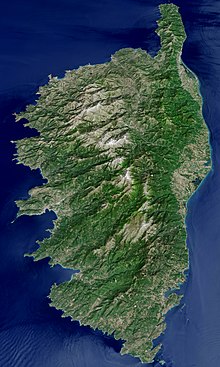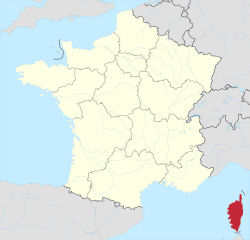Corsica
Island and administrative region of France / From Wikipedia, the free encyclopedia
Dear Wikiwand AI, let's keep it short by simply answering these key questions:
Can you list the top facts and stats about Corsica?
Summarize this article for a 10 years old
Corsica (/ˈkɔːrsɪkə/ KOR-sik-ə, Upper Corsican: [ˈkorsiɡa], Southern Corsican: [ˈkɔrsika], Italian: [ˈkɔrsika]; French: Corse [kɔʁs] ⓘ; Ligurian: Còrsega) is an island in the Mediterranean Sea and one of the 18 regions of France. It is the fourth-largest island in the Mediterranean and lies southeast of the French mainland, west of the Italian Peninsula and immediately north of the Italian island of Sardinia, which is the land mass nearest to it. A single chain of mountains makes up two-thirds of the island. As of January 2023[update], it had a population of 351,255.[1]
Collectivity of Corsica
| |
|---|---|
 | |
| Anthem: Dio vi salvi Regina (unofficial) | |
 Location of Corsica within France | |
| Country | |
| Prefecture | Ajaccio |
| Departments | |
| Government | |
| • President of Executive Council | Gilles Simeoni (Femu a Corsica) |
| • President of the Corsican Assembly | Marie-Antoinette Maupertuis |
| • Prefect | Amaury de Saint-Quentin |
| Area | |
| • Total | 8,722 km2 (3,368 sq mi) |
| Population (2023)[1] | |
| • Total | 351,255 |
| • Density | 40/km2 (100/sq mi) |
| • Languages | French (official) Corsican Ligurian |
| Demonym | Corsican |
| Time zone | UTC+1 (CET) |
| • Summer (DST) | UTC+2 (CEST) |
| ISO 3166 code | FR-20R |
| Website | www |
The island is a territorial collectivity of France. The regional capital is Ajaccio. Although the region is divided into two administrative departments, Haute-Corse and Corse-du-Sud, their respective regional and departmental territorial collectivities were merged on 1 January 2018 to form the single territorial collectivity of Corsica. As such, Corsica enjoys a greater degree of autonomy than other French regional collectivities; for example, the Corsican Assembly is permitted to exercise limited executive powers. Corsica's second-largest town is Bastia, the prefecture of Haute-Corse.
Corsica was ruled by the Republic of Genoa from 1284 to 1755, when it seceded to become a self-proclaimed, Italian-speaking Republic. In 1768, Genoa officially ceded it to Louis XV of France as part of a pledge for the debts incurred after enlisting French military help in suppressing the Corsican revolt; as a result France annexed the island in 1769. The future Emperor of the French, Napoleon Bonaparte, was a native Corsican, born that same year in Ajaccio: his ancestral home, Maison Bonaparte, is now a visitor attraction and museum. Because of Corsica's historical ties to Tuscany, the island has retained many Italian cultural elements and many Corsican surnames are rooted in the Italian peninsula. Corsican, the native tongue and an Italo-Dalmatian language, is recognized as one of France's regional languages. Corsica is the third-least populated region of France after Mayotte and French Guiana.

